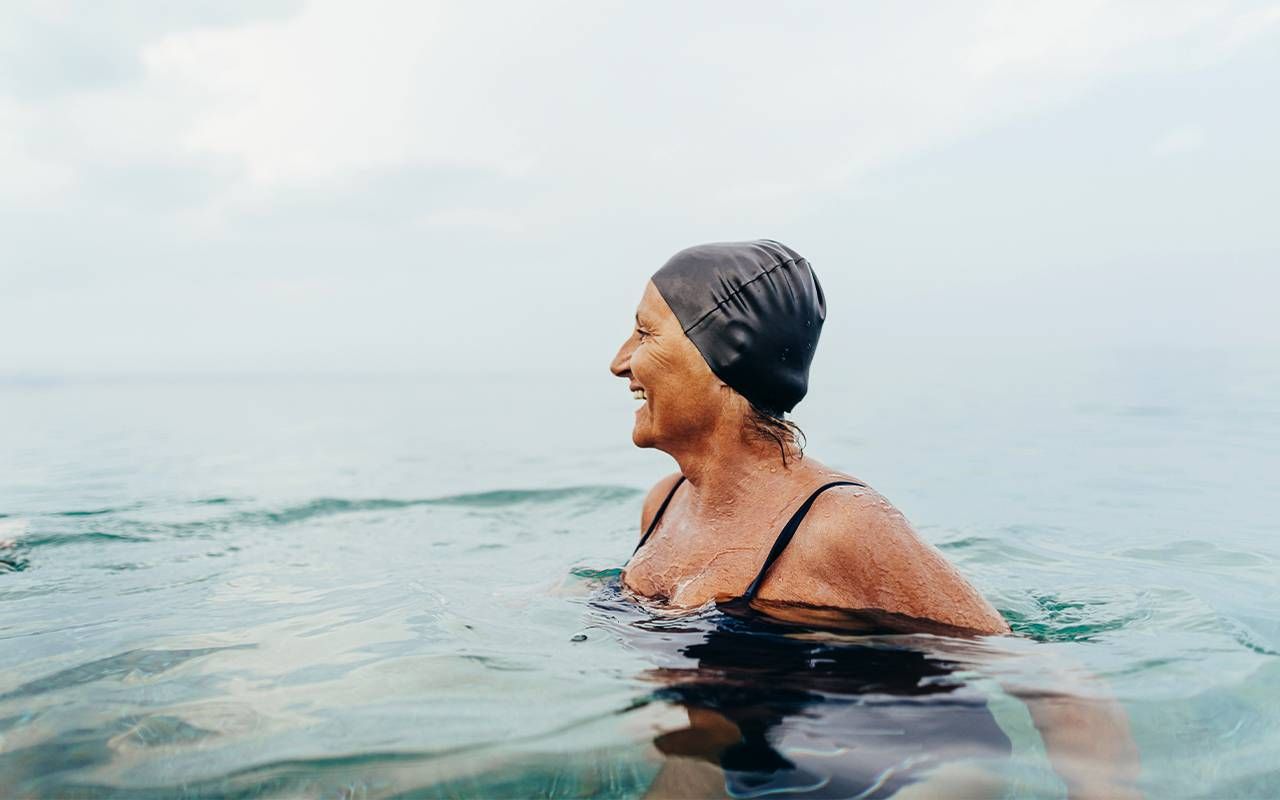The Value of Body Neutrality
Body neutrality can help us relate to our physical selves differently
Growing up in the 1980s, I was a typical angsty adolescent who worried about homework, grades and fitting in with peers. But most of all, I worried about how my body looked.
My calves were knobby, my hair frizzy from countless hours in chlorinated pools. I lamented my splotchy skin and my short, stocky frame, which looked nothing like the dewy-faced, willowy models in Seventeen Magazine.

I was close to my mother, an unfussy eater who never, to my knowledge, went on a diet. So whenever I complained about my appearance, my mom didn't try to talk me out of my feelings. Instead, her usual reaction was, "Honey, your body is just fine." Then we'd move on.
"Body neutrality is letting your body look and be the way it is, and it doesn't have to mean anything."
Decades later, I have two daughters of my own, and we're navigating the rocky terrain of body image together. So recently, when I heard the term "body neutrality" on a podcast, I thought of my mother's relaxed, non-judgmental approach – and I wanted to learn more.
What Is Body Neutrality?
The concept of body neutrality wasn't widely known until 2015, gaining popularity after Anne Poirier published a book, "The Body Joyful," using the term. Today, health coaches and fitness instructors are embracing it, as are celebrities, including musician Lizzo and actor Jameela Jamil.
"Body neutrality is letting your body look and be the way it is, and it doesn't have to mean anything," says Pam Moore, a certified intuitive eating coach and occupational therapist in Colorado.
We may dislike the shape of our noses or how our jeans fit, but we still treat our bodies with respect – and our self-worth isn't connected to how our bodies look or perform.
"From a clear place, you can see that your body is the least interesting and important thing about you," says Jessi Kneeland, a North Carolina body image coach and author of the forthcoming book "Body Neutral: A Revolutionary Guide to Overcoming Body Image Issues."
Kneeland compares body neutrality to walking past a messy or unattractive part of your home. You might think the room could use a fresh coat of paint or deep cleaning, but this thought doesn't ruin your day.
Similarly, parts of your body might bother you, but "they don't have the power to cause you inappropriate suffering," says Kneeland.
Notably, body neutrality differs from body positivity, which dates back to the 1960s and promotes the idea that all bodies are beautiful. The movement began when the National Association to Aid Fat Americans (now called the National Association to Advance Fat Acceptance) advocated for people in larger bodies.
Over the years, body positivity has been a recurrent theme in popular culture, from Dove's Real Beauty advertising campaigns to ubiquitous social media hashtags like "body-positivity" and "love your body."
The Body Positivity Problem
Though body positivity can be empowering, it's not for everyone – and many people have been harmed by it, says Kneeland. If someone has struggled with body image for years, telling them to love their curves and stop caring what others think is far from an instant cure.
One downside of body positivity is that it can layer guilt and shame on top of whatever challenges a person is already facing. For example, when you don't like what you see in the mirror, the next thought becomes, "Oh my God, I'm supposed to be body-positive; I'm not supposed to think that," Moore says.
There is an unwritten rule among women my age: We must not speak negatively about our bodies. If one of us should say something degrading about how we look, the knee-jerk response is, "But don't say that! You're beautiful!" It's almost verboten to describe ourselves as anything less than stunning.
Parts of your body might bother you, but they don't have the power to cause you inappropriate suffering.
But too often, that approach feels inauthentic and doesn't help. Considering the narrow definitions of beauty we've absorbed throughout our lives, "it's unreasonable to imagine that you're going to flip a switch one day and just suddenly be, like, 'I love my body,'" says Moore.
At its core, body positivity "still focuses on the superficial of, 'I look this way,' as opposed to, 'I am a good person,' or 'I have all these good qualities,'" says Marley Blonsky, co-founder of All Bodies on Bikes, a body-neutral, inclusive cycling community-based in Arkansas.
"It encourages people to love inconsequential parts of their bodies," says Blonsky.
Practicing Body Neutrality
Body neutrality can help us relate to our physical selves differently. While getting to that place takes time, we can move toward it.
"The first step is to become conscious of what meaning you're assigning to the thing you dislike," says Kneeland. For instance, someone who hates their legs may believe that thin, toned legs will translate to being accepted, desired, and loved. But getting those needs met and feeling worthy of love has nothing to do with our bodies.
When talking with kids, adopt an approach of "non-judgmental curiosity," says Moore. If your child (or grandchild) says they hate their stomach or their thighs are too big, ask why they feel that way or what prompted the thought.
"I think the fear is that if we go there and talk about it, we'll somehow make it worse," she says. But with my daughters, who are 11 and 13, I've found it helpful to invite more questions.
Another way to shift your thinking is: Look critically at mainstream beauty standards and point out unrealistic examples. If you're watching a show where many actors look like supermodels, talk about why that might be the case, says Moore.
None of us are guaranteed these bodies tomorrow, so we should focus on other aspects of ourselves that will still be here.
People may have had surgical or cosmetic work, or perhaps they're genetically in smaller bodies. Is that an Instagram photo of what someone looks like, or are they wearing a lot of makeup and using a filter? What we consider beautiful may not be real.
Moore also suggests using "add-on" thoughts to help counter the shame spiral that can happen when we're focused on something we dislike about our bodies.
If we hate how our stomach looks on a particular day, it's easy to slip into moral judgments: We're not disciplined enough with exercise or didn't eat the right foods.
An alternative response is to follow up that first thought with a more neutral statement that's still true. For example, we might try, "I don't love my stomach today – and I don't have to," says Moore.
Ultimately, says Blonsky, "none of us are guaranteed these bodies tomorrow, so we should focus on other aspects of ourselves that will still be here." I'm keeping that advice in mind.
Though my body image struggles are different now than when I was younger, there are still challenges. And in a culture saturated with highly positive and negative narratives about our bodies, I want my kids to know there is another option.
On a recent night, my younger daughter and I were in the bathroom doing skincare. "Mom," she said, "is it okay if I don't like my stomach?" She looked wary as she eyed her midsection.
I pause, tempted to tell her that this is silly, that her body is beautiful and perfect. But, instead, I say, "Yes, it's okay not to always like your body. Look, I have a big scar on my tummy that I don't love. But your body isn't the most important thing about you – far from it."
She nods, satisfied. And we move on with our evening.


